Subtotal: $
Checkout-

Can Love Take Sides?
-

A Defense of Vows
-

Why I Chose Poverty
-

Demystifying Chastity
-

The Adventure of Obedience
-

Vows of Baptism
-

Hutterite Ten Points of Baptism
-

The One Who Promises
-

Vows in Brief
-

The Raceless Gospel
-

Poem: “Blessing the Bells”
-

Poem: “Autumn in Chrysalis-Time”
-

Tiny Knights
-

Editors’ Picks: What Your Food Ate
-

Editors’ Picks: Untrustworthy
-

Editors’ Picks: The Last White Man
-

Retooling the Plough
-

Charting the Future of Pro-Life
-

Letters from Readers
-

Home in My Heart
-

Remembering Alice von Hildebrand
-

Sadhu Sundar Singh
-

Covering the Cover: The Vows That Bind
-

The Day No One Would Say the Nazis Were Bad
-

John Wayne, The Quiet Man
-

No Promises
-

Word Is Bond
-

Bring Back Hippocrates
-

The Dance of Devotion
-

Victor Hugo’s Masterpiece of Impossibility
-

A Vow Will Keep You

A Broken but Faithful Marriage
My grandparents separated for decades. But they never broke faith with their bond.
By Dori Moody
September 9, 2022
Available languages: español
There are no beautiful surfaces without a terrible depth.
—Friedrich Nietzsche
I like to think that I touched Opa’s beard, and could feel its fibers. But like everything about Opa, I’m not sure. Maybe this is a fabricated memory based on the black-and-white photo in family albums – the little girl in the picture is not me but my older sister. Of Opa, my dad’s father, I know little. He died when I was seven, but his wife, my Oma Rose (pronounced Rosa, in the German way) outlived her husband by fourteen years, many of those as a member of my parents’ household.
My grandparents were among the very first members of the Bruderhof, a community church founded in rural Germany as a response to the destruction of World War I. My grandfather, Manfried Kaiser, was known within the community as quirky and sometimes annoying. Partially deaf, he had a heart of gold and generally thought the best of others. But he was also eccentric and prone to rash decisions, and he tended to confuse those who were trying to help him. Although he made lifetime vows as a member of the Bruderhof in 1930, he left the community multiple times. And although he believed in marriage for life and deeply loved his wife, the mother of his seven children, he walked out on his family more than once.
They were reunited many times, but they lived the last decades of his life apart, at her insistence. What was the meaning of the vows they took, then, which came to such an end? Why did he put his family through so much pain? What really happened during his disappearances? Why, with so much good-faith effort from all involved, was there no healing in this life? These questions troubled me, setting me on a search of family archives and historical records.

Olha Pilyuhina, In Anticipation of Joyful Embrace, handwoven natural-wool tapestry, 2020 All artwork by Olha Pilyuhina. Used by permission.
Manfried was born in 1900 into a Thuringian family not far from where Friedrich Nietzsche lived. Manfried grew to appreciate Nietzsche for calling out the decadence and decline of Western society. I appreciate Nietzsche for a different observation. In The Birth of Tragedy, Nietzsche profiles the Greek gods Apollo and Dionysus, both sons of Zeus. Apollo, who stood for light and order, was the favorite, while Dionysus was raised by the river nymphs. He enjoyed music and dancing, drinking and revelry, and has always been connected to madness. Dionysus was eventually murdered by the Titans out of jealousy, but he rose again, resurrected from his severed limbs. Nietzsche called Apollo the “art-shaper,” the type of god who got things done. Dionysus, free-spirited and vulnerable, Nietzsche says represents the “non-plastic art of music.” But in this Nietzsche firmly linked the opposite gods together.
This analogy may be extended. Imagine a world that is all law and order, or imagine a world that is only chaos. Singly each could inflict damage and pain, paired they may create vibrant community. Any human association needs Apollo’s law and order, but it also needs the creativity – and, yes, the chaos and emotion – of Dionysus.
My grandfather was like Dionysus, vulnerable and free-spirited, and it was this temperament that led him to visit the Bruderhof in the winter of 1929. There, he met Rose Meyer, who had joined a few years earlier, and they became engaged.
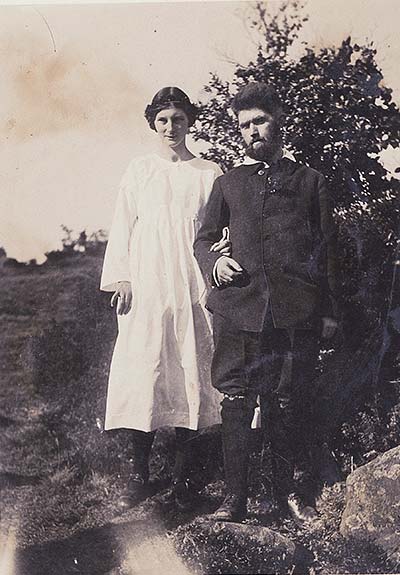
Manfried and Rose on their wedding day, 1930 All photographs courtesy of the Kaiser family.
Marriage vows on the Bruderhof were taken as seriously, and considered as permanent, as the lifetime vows of membership. Eberhard Arnold, leader and founder of the community, prepared Manfried and Rose for their wedding over the next full year, with much care. On March 2, 1930, Eberhard officiated the wedding; the text began with the Sumerian Lament of 2000 BC and ended with Revelation. One line stands out: “In the heavenly wedding of pure love, cosmic perfection reveals itself.”
In their wedding photo Manfried and Rose stand looking toward the horizon. Manfried wrote he was “joyful beyond all his dreams.”
There were problems from the beginning. Manfried’s warm and cheerful outlook was his strength, but his opinionated nature and poor decision-making caused friction. After a particularly difficult day in 1933, Manfried and Rose were invited to speak to the other members. Rose asked for prayers. She was often quite desperate at home with her growing family and unpredictable husband. Eberhard urged compassion for “our dear Rose” and understanding for Manfried, whose unfortunate memory-clouding made him unreliable but who “clearly has a good will and does his best to radiate love and kindness.” Eberhard exhorted the fellow members to help lovingly carry the challenges that Manfried and Rose faced as individuals and as a couple. “We want to stand faithfully by our Rose,” he said, “and we want as a church community to be completely open for Manfried and to help him.”
Manfried and Rose never forgot this pastoral support. My grandfather loved the word Gemeinde, which literally translates as “church,” but for him it meant something more akin to a church-brotherhood. His reverence for the mystical body of the Gemeinde ran through his very soul. For Manfried, being a lifetime member of a church that admonished but also forgave was being a part of a great whole. A wholeness that encompassed even faults.
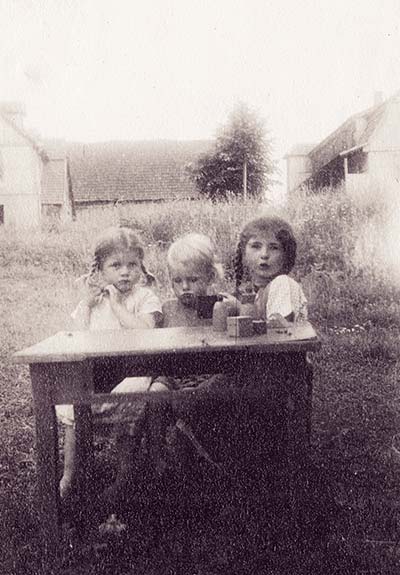
Children of Manfried and Rose at the Bruderhof in Germany, 1935
In 1934 my father Leonhard (always “Loni”) was born after two daughters, Detta and Rosie. Filled with awe at the arrival of a son, Manfried wrote to Eberhard with great cheer. Rose also wrote, referencing a recent address Eberhard had given entitled “The Root of Grace.” In this talk, he spoke of his own weaknesses and failings, the limitations of human power, and the greatness of God: only when man relinquished his own power could God work through him. Rose, feeling very powerless already, desired to find God’s will in her vulnerability. It was clear that life at home with a new baby was not easy.
And then Manfried took off. He was gone for a few days.
Eberhard heard of this departure, and he wrote to Manfried and Rose afterward, “It was a difficult time for you both when you, dear Manfried, went away so unexpectedly. This pained me for you and for all of us, but I thank God that he protected you and brought you back home.” He suggested, “If ever a dangerous heaviness comes over you again, I expect you to come at once in trust to me. When in earnest, the prayer of faith is powerful.”
As the 1930s wore on, times became very tough indeed. When the Nazi government closed the community school in 1934 (an inspector was shocked to discover the pupils hadn’t been taught any Nazi songs), the Bruderhof whisked away the community’s children to Liechtenstein for schooling and refuge, including five-year-old Detta. Family separation and extreme poverty now faced all the members as National Socialism made communal life more and more difficult. Anxiety mounted at the possibility of betrayal by local villagers. The strain of persecution and separation of family wore on the Kaisers. Manfried’s declining hearing didn’t work well with the need to whisper so as not be overheard by unfriendly neighbors.

Olha Pilyuhina, Golden Birds, handwoven natural-wool tapestry, 2019
Manfried left again for a month. Eberhard’s care of the couple sustained them, and by October 1935 Manfried was once again in good standing as a member. But the hammer blows that ended the year were swift and shocking. Eberhard died unexpectedly on a dismal, cold November day after a failed surgery. In December, still reeling, Manfried and Rose lost their fourth child, Daniel Eberhard, only three hours after he was born. In the desolate cemetery, Manfried had said farewell twice, first to a great man of God, then to his own child who had not even lived one day. Small solace that their two graves were close together in the frozen ground.
The community, now lacking Eberhard’s leadership, faced increasing sanctions from without, fatigue and discouragement from within. Then in September 1936, Manfried and other adult males were called to register for the German military. Manfried could not obtain a passport, so could not travel abroad. But in April 1937, just ten days before the German Bruderhof was dissolved by the Gestapo, the Kaiser family chanced traveling without passports toward an English Bruderhof. Now expecting their fifth child, the family took a train out of Germany and boarded a ship to Dover. By some fortuitous chance, they were allowed entrance. Manfried would never return to his German homeland.
When Rose gave birth to another girl, Sara Monika, that June, Manfried felt “God was a true friend” in sending this new, English-born daughter. Though they hadn’t left all their troubles behind, their time in the Cotswolds was a respite after years of starvation and persecution. A spring day in May 1939 brought the joyful welcome of a baby brother, Paul Gerhardt.
But the peace didn’t last. By the fall of 1939 anti-German sentiment ran so high that after England declared war on Germany on September 3, the German members of the Cotswold Bruderhof community had to appear before a tribunal and were ordered to remain within a five-mile radius of home, or be sent to internment camps.
Within weeks of this declaration, Manfried was picked up outside the radius. Why he was there was not clear. There are conflicting accounts. Some say he deliberately walked outside the zone to attract arrest, others that he wandered out by mistake. A fellow community member recalled that the road signs in the surrounding villages were intentionally changed to confound an invading German army, but in the end only confused a refugee. Manfried himself stated that he had experienced a breakdown.
His case was reviewed by a tribunal, but the record of what happened there remained buried for eight decades. Only now does a Freedom of Information inquiry with the British National Archives dispel some of the mystery.
On the back of the “Male Enemy Alien Internment Refugee” card, the judge in the case describes a refugee who “speaks practically no English, is intractable in camp, and is obviously mentally unstable. He may run away from camp again and professes his intention of doing so and has the idea that imprisonment transforms him into a martyr.” (Manfried’s “martyr” reference likely referred to 1935 meetings when Eberhard Arnold had admonished community members to be ready to stand up against the Nazi regime. Eberhard had recalled the Anabaptists of the Reformation era who had suffered imprisonment and death as martyrs for their faith; he urged community members to be ready for the same fate.)
The judge recommended against internment and raised the question of commitment to a mental hospital. But when, “in defiance of my warning yesterday,” Manfried again went out of bounds, the judge sent him to be interned. He was not heard from again until February 1940, when he sent a disjointed note from his internment camp in southern England.
Back in the Cotswolds, the day of Manfried’s disappearance came like destruction. Rose had to deal with all the unanswered questions, the reports from authorities, the bewilderment of her fellow church members, and the devastation of their children. Little Rosie cried night after night in panic and fear for the safety of her father. But in the light of day the perceptive child felt shame. What great crime had her father committed that police snatched him away from her?
On June 24, 1941, Manfried was sent with other German internees to the seaport of Liverpool. There the ocean liner Duchess of York took them to Canada. A similar convoy of internees had left Liverpool for Canada on July 2, 1940, aboard the Arandora Star, which was torpedoed and sunk by a German submarine off the Irish coast. Over half the 1,524 crew and passengers died. The Duchess of York, thankfully, arrived safely in Canada.
Of the next seven years in exile, Manfried never spoke.
Rose and her children didn’t stay long on English soil either. Due to increasing local hostility against the pacifist, German-speaking Bruderhof and reports of “enemy aliens” being rounded up, the Bruderhof decided to leave England. In March 1942, the rest of the family arrived in the Paraguayan jungle. There was at least some communication: five letters Rose wrote to her husband from Paraguay were preserved by a fellow internee, Hugo Brinkmann. Manfried must have shared the letters with Hugo, who transcribed them into his own diary. (Hugo, who became Manfried’s closest friend, would himself join the Bruderhof after the war, introduced to it by these letters from Rose.)
Rose’s first letter was dated August 28, 1941, almost two years after Manfried disappeared from the Cotswold community. Characteristically humble, she began with a wish for pardon for any hurt she may have caused him. She wrote of her wish that Manfried would return to his vocation, and be reinvigorated by the love he had felt when he joined the Bruderhof. Her last sentence: “So I ask you with heartfelt wishes for forgiveness, and I greet you with an old yet new love.” Did my grandfather ever ask her for forgiveness? I don’t know.
When I reread these letters, I feel the anguish of a wife missing her husband. She wrote great thoughts as if in answer to her own painful, smaller, and necessary thoughts of immediate survival. She had five children from two to ten years old to parent alone. She still grieved the loss of her fourth child; she wondered how her mother and siblings fared back in Germany. Rose stayed true to her vocation, but in the bitter battle against doubt and despair, peace disappeared along with her husband. It too seemed to be interned, somewhere far away.
Manfried wrote faithfully to Rose, but only one of his letters survives, a response to the suggestion from Bruderhof ministers that when released, he go first to a Hutterite colony in Canada (at the time the Bruderhof and the Hutterites were sister churches). Manfried agreed without reservation; nothing was too hard if in the end it led back to the Gemeinde. But the letter’s final sentence, “When will redemption come?” captures Manfried’s deep loneliness.
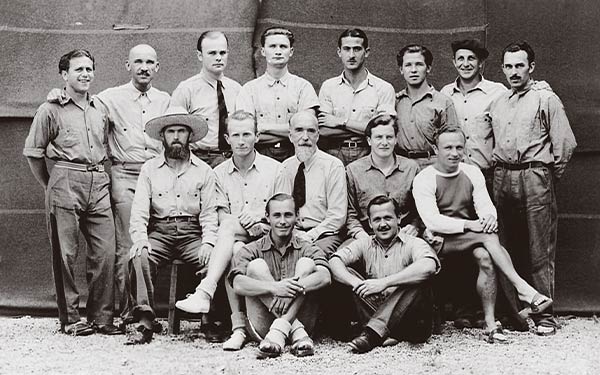
Manfried, center row, far left, at a POW camp in Canada, 1942
By August 1943 Manfried had joined other internees allowed to work outside the camps for local Canadian farmers. The work outdoors afforded them a bit of freedom. Apparently, the overwhelming desire to be back with the Gemeinde bombarded Manfried’s heart and mind so forcefully as to overcome all reason. Despite the fact that the nearest Hutterite colony was miles away, he decided to head in that direction, leaving behind a note explaining his intentions and destination. Once again he was on the run, absent without leave. He was recaptured just up the road. He could have been shot, but the Canadians were kind and patient. His punishment was not severe, but his days working on farms were over.
This episode was never part of family lore; I only learned about it thanks to a lead from a Canadian museum. As I picture it, all these years later, my heart feels like cheering him on: “Go, Opa, go!” Then I feel a sheepish chagrin at my reaction, for deep down I am pleased that nobody back at the Bruderhof is likely to have known that he had once again “run away.” I am happy to share this little secret with Opa and the Canadian authorities.
On May 8, 1945, the inmates of the camps were called together for the announcement that Germany had surrendered and the war in Europe was over. One internee remembers the goodbye speech of their presiding camp officer, who cautioned those leaving the relative peace and security of the camp that they would return to altered circumstances: “Remember when you go home your relationship has changed, and you have changed. You have been long apart.”
All internees who had come from England were returned there first. Finally, in August, 1946, Manfried began the lengthy journey to Paraguay by way of Morocco. My image of him during a layover in Casablanca comes from the film by that name: I picture him walking past Rick’s Café Américain with poignant scraps of Dooley Wilson’s song trickling out into the street: “Woman needs man, and man must have his mate, that no one can deny.” After seven years, Manfried was on his way to find his Rose.

Olha Pilyuhina, Fidelity, handwoven natural-wool tapestry, 2020
For his long-anticipated arrival, the Kaiser family assembled with the rest of the community. Approximately two hundred members gathered in a big circle for the welcome. Loni strained to see the incoming wagon, and Paul Gerhardt jumped up and down. Two men were in the wagon: one tall and young, one aged and worn. “Run to your father; there is your father!” the community members exclaimed.
Loni and Paul Gerhardt, suddenly unsure, were propelled forward. Rosie, coming behind them, saw her brothers not knowing which newcomer to choose. They hugged the taller man, the wrong one. She saw her mother, overcome with shyness, remain in the background. Rosie went to her father, who seemed much smaller than she remembered. Manfried walked from one person to the next, shaking hands and looking deep into faces. He was home.
First came the miracle. Ten months after Manfried’s return to Rose, very early on July 25, 1948, a baby girl was born. Manfried woke up Rosie to tell her the joyful news. Phoebe Elfriede Kaiser, nine years younger than Paul Gerhardt, was the baby her siblings had long dreamed of.
Then came the reality. A new father again at forty-eight, Manfried felt much older. He couldn’t hear well at all, and often had severe headaches. Meanwhile, Rose was impatient for him to catch on to being a family man. After seven years, surrounded only by men, he had lost the knack of being around women and children. Trouble with home life mirrored community life. The Gemeinde, having struggled through a decade of poverty, harsh climate, and terrible world events, was not how Manfried remembered it.
Over the next decade the couple tried to reclaim the lost years. There was little professional help available for the hearing problems Manfried endured, or the mental anguish they both suffered.
During one of these periods, my father’s friend taught him chess, a passion he would eventually share with me. In chess, a situation in which one is obliged to make a disadvantageous move is called zugzwang. It almost always means the loss of a key piece, and often defeat. Zugzwang sums up the state of the Kaiser family during those years; keeping the marriage together appeared doomed.
In 1956 the German government passed a law allowing for federal compensation for victims of National Socialism. Manfried, Rose, Detta, and my father all lodged claims. Manfried’s claim was misplaced (this is so characteristic I am hardly surprised), but the other claims were with my family records – I pore over the records for weeks, translating and collecting information. In the end though, the amounts don’t really matter. Who can price human suffering? Money cannot purchase forgiveness or closure, and I find myself angry once again at men and governments long dead. Then I discover something.
Mistakenly attached as the last document of my father’s seventy-five-page record, there is a typed page of notes from Manfried’s lost file. Here I learn which illness caused his deafness, and a potential contributor to his eccentric behavior over the years.
In 1925, years before he met my grandmother, Manfried had been hospitalized in Hamburg with “brain fever.” The record states: “Since then, progressive bad hearing with tinnitus, and headaches.” Likely this was encephalitis, a serious condition causing lingering aftereffects, like headaches, seizures, and memory loss, even psychosis. His physical and mental infirmities were no one’s fault. But the pain they brought about was the birth of his and my family’s tragedy.
Whatever the cause of human frailty, the question becomes: What is to be done? Nietzsche described the life of the übermensch (superman) as the way for man to rise above a fallen state; man was doomed to fail unless he could generate superhuman qualities.
Eberhard Arnold advocated for the opposite. Where Nietzsche bemoaned the state of being “all too human,” Eberhard held that being human was no shame, provided this vulnerability led to reliance on the power of God. To Eberhard, Jesus was the übermensch, the man who rose above.
Like my grandfather, Nietzsche experienced significant mental infirmity toward the end of his life, and even came to sign his letters “Dionysus.” His brilliance and will to power could not save him from a lonely and desperate end.
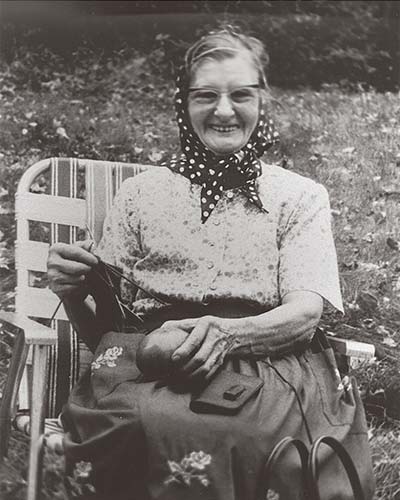
Rose Kaiser, early 1980s
In the fall of 1953, seven years after Manfried’s return, my grandparents separated for good. Rose moved to a different Bruderhof community, and never lived again under the same roof as her husband. This final separation came after much effort, from within the family and without. Was Nietzsche, not Eberhard, correct? God had seemingly not answered their prayers with healing.
Manfried never gave up hope of reuniting with his wife. In a letter in March 1955, around their twenty-fifth anniversary, Manfried again wrote to “My dearest Rose!” He simply greeted her with love because he could not visit her in person.
Rose always worked hard, and seldom complained. But her soul hurt. After almost twenty years in Paraguay, she went back to Germany in 1961, to visit her mother and brother Willi in Dresden. Willi had tuberculosis and looked aged and worn; his wife and two children, of Jewish descent, had been exterminated in the Holocaust. Her brother Gerhard had also died in the war. There was the happiness of reunion, but also the extreme sadness of memory and loss. Rose’s hometown was in ruins, her family shattered.
Recognizing her fragile mental state, a Bruderhof community doctor accompanied Rose to a psychiatric hospital, where she was treated for six weeks. Her psychiatrists observed that she was “under special burdens” and “prone to paranoid reactions.”
The special burdens that Rose carried were so myriad, I marvel that her life did not end here, in 1961, at the age of fifty-seven. But she lived another thirty-four years. I cannot say her burdens disappeared. I hesitate to speak of healing. One’s spirit can be broken beyond complete repair. Stories of resilience and the indomitable human spirit might happen in other families, but that didn’t happen in mine. But the largest burden Rose carried, the burden of perceived failure, did heal.
Manfried’s life was in pieces. The deaths of his spiritual father and a baby son weighed on him, and now his wife was gone too. He was chopped down, reduced. What wholeness can rise from such brokenness? What does it mean for Dionysus to rise with life in his dismembered limbs?
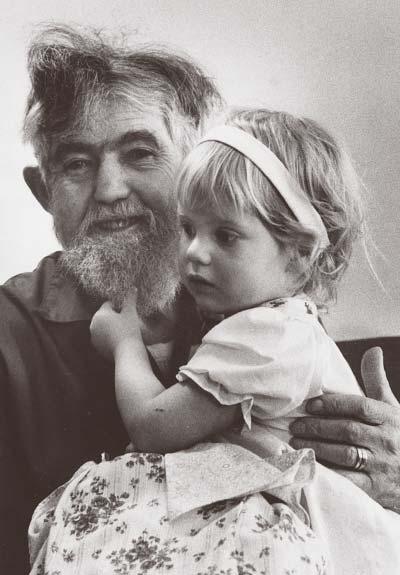
Manfried with a granddaughter, the author’s sister, in 1974
On his sixtieth birthday, Manfried wrote, “In the beginning, I was often angry about my desperate surroundings.” From these depths, he decided: “So I look to the greatness of the cause, and will only serve love, not anger.” He concluded, “Humble, I must remain.” His decision to turn from anger and set his heart on humility was the path of Eberhard Arnold, who thirty years before had bequeathed to Manfried and Rose a great gift – the guidance to strive downward, to dismantle human power, to surrender everything to Jesus.
This surrender had started long ago in another vow. Manfried and Rose had both been baptized as adults, my grandmother before she joined the community, and my grandfather by Eberhard Arnold. Their baptismal vows to God provided a foundation in their lives, binding them to “the fellowship of believers.” Many times over the years, this link would give them something solid to stand on.
The last decades of my grandparents’ lives were similar. Both were joyful members of the Gemeinde. Manfried gardened, sang, read voraciously, and hand-lettered “psalms” or poems for people he loved. Rose gardened, knitted, and when asked to by her grandchildren, juggled. The sad parts of the past fell away.
Opa Manfried lived eighty-one years and died surrounded by his children. He was buried on Good Friday, April 15, 1981. His wife Rose could not bring herself to attend the funeral, but listened to the service by telephone from her home, a Bruderhof community two hours distant. My aunt Rosie, grieving his loss, additionally felt deep pain for her estranged parents. When she returned after the funeral, she did not know how to relay the experience to her mother. She felt unable to share about the holy victory that surrounded her father’s last hours. Manfried had run to his final destination. He was home at last.

Olha Pilyuhina, I Fly to You, handwoven natural-wool tapestry, 2020
When I read Aunt Rosie’s memoirs about this day I cannot hold back my own tears, which splash down onto my collected notes. I brush the tears away angrily, for I am suddenly upset. But toward whom? Whose fault is it anyway? Then I am silent, strangely comforted in the knowledge that Opa was buried on a Good Friday. And I do not dare to speak of justice to the Father of the Crucified on Good Friday.
As the dismemberment of Dionysus ends with rebirth, so too is Good Friday not the end. My own baptismal vows, taken just weeks before my grandmother’s death in 1995, hang on the timeless assurance that resurrection crowns sorrow, that cosmic perfection will be revealed.
Somewhere during my research I read that up to 80 percent of the men who returned from Canadian internment after World War II experienced failed relationships. Whether or not that is true, Manfried’s marriage to Rose did not survive those years of separation. Even a loving church could not patch together their disrupted union. The Gemeinde, after all, does not make people perfect. But it did continue to hold them when their human strength came to an end.
The six surviving children of Manfried and Rose all chose lives of commitment to the same Christian community their parents had joined. Those who married have been faithful in those marriages, and a dozen grandchildren have started families of their own. Manfried and Rose’s many descendants, including myself and my children, are grateful for the imperfect union that gave us life and for the community of the Gemeinde. We laugh together often. But when trials come along that are no laughing matter, we recall the confidence of those who loved intensely, believed always, and trusted that God would intervene when life placed them in zugzwang.
About the artist: Olha Pilyuhina lives in Reshetylivka, Ukraine, where she continues the regional tradition of tapestry-making, using time-honored technology and natural materials to create original artwork. Reflecting on the bird series accompanying this article, Pilyuhina says: “These are stories about love, trust, fidelity, and the movement of kindred souls to meet each other.”
Already a subscriber? Sign in
Try 3 months of unlimited access. Start your FREE TRIAL today. Cancel anytime.











































Kevin McCauley
Nice Story, sounds real.
Philip E. Friesen
Rocky marriages, yes, seem to be the norm. But we can learn more from studying success that flows over the rocks with grace, although never without pain.
Jadan Anderson
Dori, thank you for this lovely reflection. I'm saving this article to read and read again.
Margaret Baird
Such a heartfelt honest, reflective story. Life is not perfect this side of heaven and yet God is with us, ever kind, loving and good and just, a rock and anchor for our soul in every storm of life.
Larry Maher
Cute story but also an example of the ridiculousness of us all living under the yoke of religion, customs and traditions, all of which being extensions that we once needed to live under when life was lawless. I think the Bruderhof folks are great people but it's easy to mistake past survival tactics for morality.
TR
“Stories of resilience and the indomitable human spirit might happen in other families, but that didn’t happen in mine.” Thank you for this honest story and heartbreakingly honest statement above, which likely describes most of our family histories.
Leah Maendel
I am very touched by this memoir of your grandparents who I grew up knowing. I saw their struggles and you gave me understanding and compassion for them. It’s a fact of life that one can’t fix everything even with love and care, some brokenness is too deep but somehow the message of love, faith and commitment still shines through. I think it also brought a certain closure for you, Dori.
Jeweli
This is beautiful and so well written. My life has been enriched by this story. Thank you for sharing!